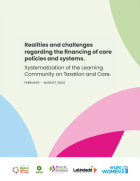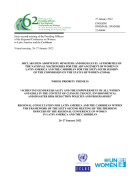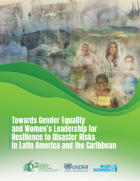1 - 6 of 6 Results
Date:
This document systematizes the learning community “Realities and Challenges on Financing Care Policies and Systems” held in 2024 by UN Women, Oxfam, GAC and other partners. Through six sessions, strategies, challenges and good practices around financing and fiscal sustainability were addressed, seeking a fair and equitable social organization of care.
Date:
Declaration Adopted by Ministers And High-level Authorities of The National Machineries for the Advancement of Women in Latin America and the Caribbean for the Sixty-sixth Session of the Commission on the Status of Women (CSW66)
Date:
Reference document for the Latin America and the Caribbean Regional Consultation prior to the sixty-sixth period of sessions of the Commission on the Status of Women (CSW66), in the context of the 62nd Meeting of Presiding Officers of the Regional Conference on Women in Latin America and the Caribbean to be held on January 26-27 2022. This consultation is organized by the United Nations Entity for Gender Equality and the Empowerment of Women (UN Women) and the Economic Commission for Latin America and the Caribbean (ECLAC).
Date:
The Latin America and the Caribbean region has the highest levels of income inequality in the world, with wide gaps in living standards across countries, regions, sectors, and socioeconomic spheres. When coupled with the pervasive gender inequality that persists, the response to Covid-19 becomes immeasurably more complicated, finds a new report by CARE International and UN Women.
Date:
The extent of the socio-economic fallout from the COVID-19 pandemic has begun to shape the “new normal” for CARICOM Member States. A 1.5% contraction of Gross Domestic Product has already been estimated by the Economic Commission for Latin America and the Caribbean (ECLAC, 2020). While governments balance this “new normal,” there is also an ‘above-average’ forecast for the 2020 Atlantic Hurricane Season, which takes place from June 1 to November 30.
Date:
Latin America and the Caribbean is one of the re- gions of the world with the highest exposure to disasters, with the Caribbean facing increased risks given its geography. This combines with the region’s high vulnerability to climate change.. The high rates of violence in the region are equally alarming, with women and girls being the most frequent victims. Humanitarian crises, regardless of the cause, affect women, men, girls and boys differently. Women and girls are the most vulnerable to suffering the nega- tive effects of humanitarian crises. For this reason, one essential requirement for effective humanitar- ian response is that the specific and differentiated needs of the population be considered, including women’s and girls’. Women and girls are also agents of change and can play a critical role in community resilience.






